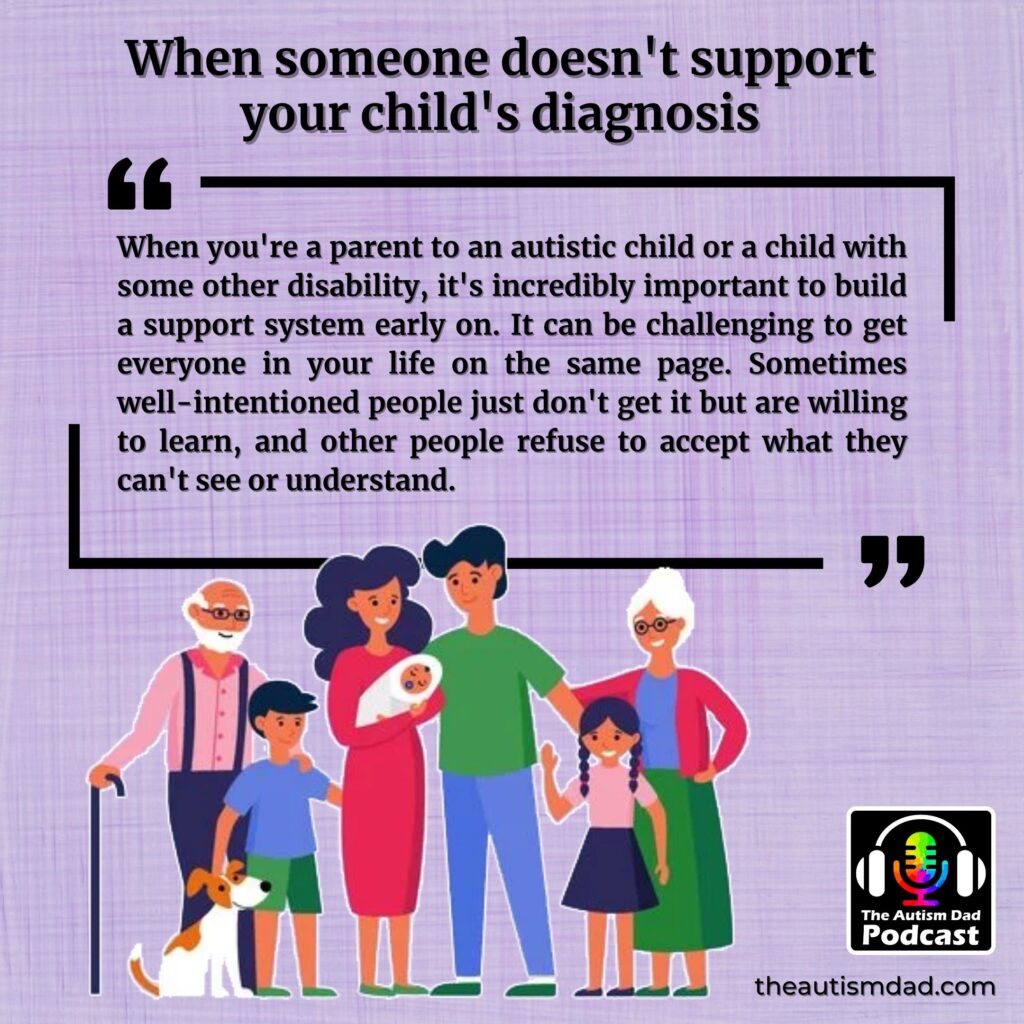When you’re a parent to an autistic child or a child with some other disability, it’s incredibly important to build a support system early on. It can be challenging to get everyone in your life on the same page. Sometimes well-intentioned people just don’t get it but are willing to learn, and other people refuse to accept what they can’t see or understand.
Over the last 20 years, I’ve had experiences with both of these situations, and I’ve had to learn some things the hard way. I want to share some insights to help you navigate some of these things.
Well-Intentioned But Ineffective Support
The first group is those who want to be supportive but don’t know how. These people may be family members or close friends. They care about you and your child, but they don’t know what to do or say. This is really common and very workable. Here are a few easy ways to help someone better understand what’s happening and how best to be supportive.
- Encourage them to ask questions.
- Answer their questions as best you can.
- Invite them to spend time with your family to gain more insight into what your life is like.
- Point them to online resources like support groups where they can gain more insight and even ask questions they may not be comfortable asking you.
- Introduce them to podcasts where they can listen and learn from others in similar situations.
I know the idea of taking the time to do some of these things can be overwhelming, but it’s truly a gift when someone wants to learn, better understand, and be a productive member of your support team. I’ve met so many parents who don’t have anyone in their lives willing to join them in the trenches and be their support. If you’re lucky enough to have someone in your life who is, it’s absolutely worth the effort.

For Those Who Aren’t Supportive
The second group is those who refuse to learn or accept your child’s diagnosis. These people might also be family members or friends, but they’re not willing to try and understand what you or your child is going through. They might make insensitive comments or jokes, and they might not be there for you when you need them the most. It can be tough to deal with these people, but it’s important to remember that you don’t need their approval or acceptance. You know your child better than anyone else, and you will be the one who advocates for them and helps them succeed in life.
Unfortunately, people in this group don’t always come around or get on board. They can create chaos in your life and even become toxic.
Here are a few thoughts and suggestions regarding managing situations like this.
- You cannot let anyone be a destabilizing force in your life.
- Set firm boundaries and be willing to enforce them.
- Set clear expectations for what is required to be a part of you and your child’s life.
- Limit exposure to anyone who isn’t supportive.
- Sometimes you have to remove negative people from your life, and that’s not your fault.
- It’s okay to be hurt, angry, frustrated, disappointed, and even sad that someone is choosing not to be supportive.
- It’s also okay to be open to cautiously reevaluating the situation in the future because people can change.
Remember that you can love people from a distance. It’s never easy to cut someone out of your life, but sometimes, it’s the only thing left to do. When your child has a diagnosis, you need everyone in your life to get with the program because their support is so incredibly important. Removing people who aren’t supportive frees up resources and space for someone else who will be.
Conclusion
If you’re dealing with people in either of these groups, remember that you’re not alone. There are plenty of other parents in similar situations. Reach out to my online support group by clicking here. It’s completely free, and I currently host over 13,000 families. It’s a great place to connect, learn from others, and share your own experiences.
And above all else, don’t forget that you’re the expert on your child and their autism diagnosis. You know them better than anyone else, and you will be the one who helps them navigate this world.
Try to help those who want to be supportive find ways of doing so that have a real-world impact. Sadly, difficult decisions sometimes have to be made, and putting firm boundaries in place or even removing toxic/negative/unsupportive people from your daily lives may be necessary. Do so carefully, but know that it’s not your fault, and you’re doing what’s best for your family.
It doesn’t matter what anyone else thinks, says, or does. As long as you do what you feel is best, learn from your mistakes, and love your child unconditionally, everything will be okay.
Your Thoughts
Do you have any advice for parents dealing with people who don’t understand or accept their child’s diagnosis? Share your thoughts in the comments below!



General society could really use some proper educating on the realities of autism spectrum disorder.
Maybe there should be an inclusion in standard high-school curriculum of child-development science that would also teach students (without being overly complicated) about the often-debilitating cerebral condition.
It may also prevent some of the abuse of ASD students by their neurotypical peers, and perhaps even by some teachers.
If nothing else, the curriculum would offer students an idea/clue as to whether they themselves are emotionally/mentally compatible with the immense responsibility and strains of regular, non-ASD-child parenthood.
It would explain to students how, among other aspects of the condition, people with ASD (including those with higher functioning autism) are often deemed willfully ‘difficult’ and socially incongruent, when in fact such behavior is really not a choice.
And how “camouflaging” or “masking,” terms used to describe ASD people pretending to naturally fit into a socially ‘normal’ environment, causes their already high anxiety and depression levels to further increase. Of course, this exacerbation is reflected in the disproportionately high rate of suicide among ASD people.
[As for my own autism-spectrum-disordered brain, I’m sometimes told, “But you’re so smart!” To this I somewhat agitatedly reply: “But for every ‘gift’ I have, there are a corresponding three or four deficits.” It’s crippling, and on multiple levels!]
There could also be childrearing/parenting instruction in regards to children born with ASD, with the rate of such births increasing. Low-functioning autism is already readily recognized and treated, but higher-functioning ASD cases are basically left to fend for themselves.